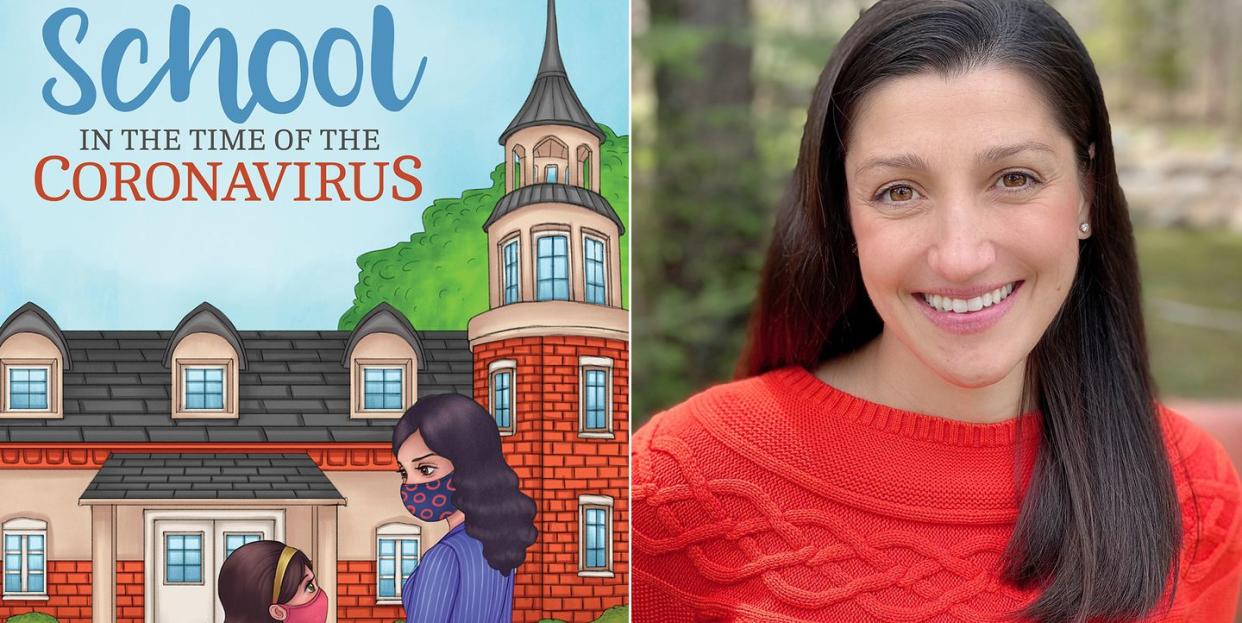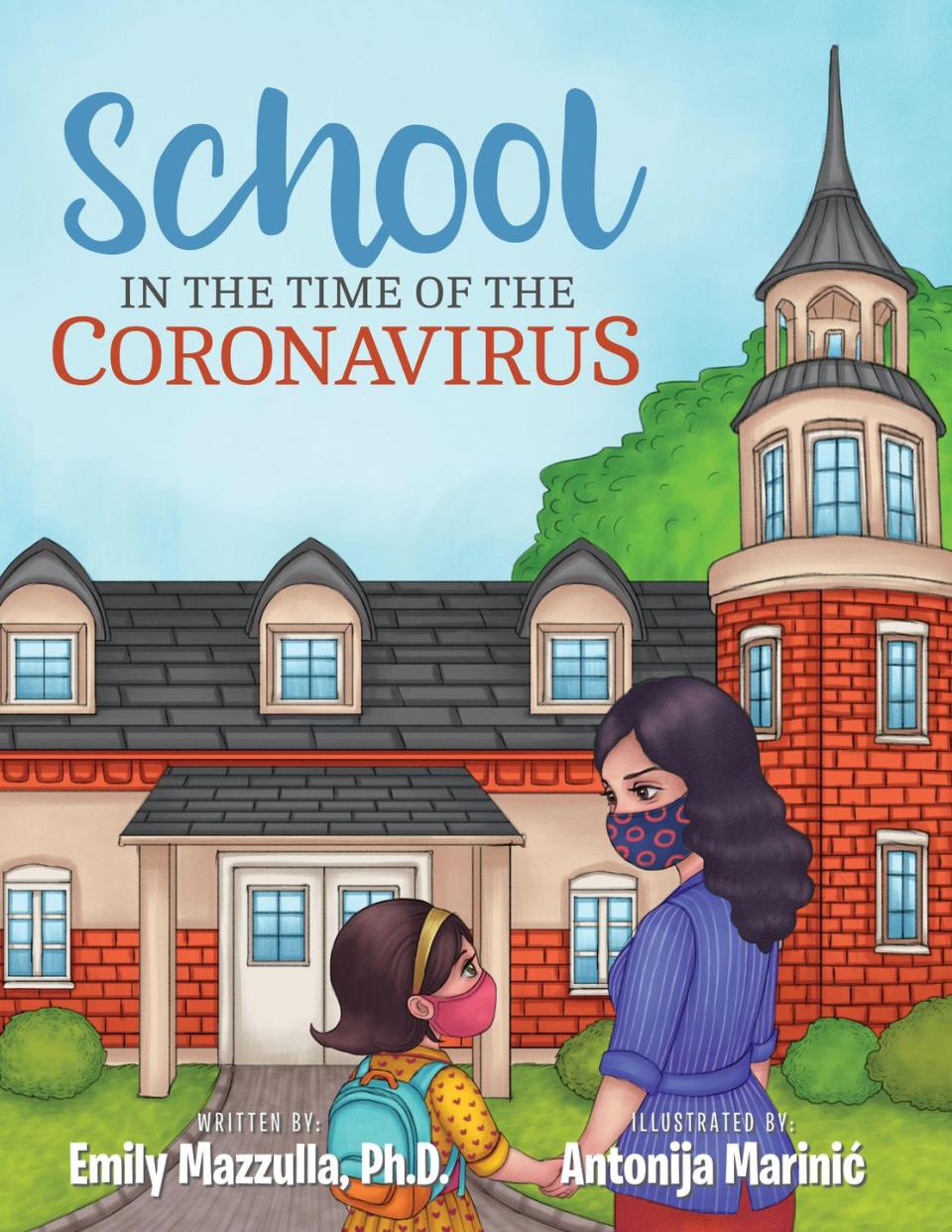The Must-Read Book to Prepare Your Kids (and You) For School During COVID

Like most parents across the country, I've been dreading back-to-school season in the age of COVID-19, social distancing, and mandatory masks. But perhaps even more dire than the idea that I will, once again, be facilitating at-home e-learning for my budding first grader while simultaneously caring for his baby brother and working from home, is the inevitable conversation I must have with my son about the upcoming school year. It's difficult to know what to tell him, other than that he won't be going to school in-person in the fall, and it's even harder to have that necessary conversation knowing he will be disappointed, confused, and just plain sad.
This is an issue Dr. Emily Mazzulla, Ph.D., a clinical psychologist and mom of three, knows all too well. Whether it's through her work as a clinical assistant professor at Marquette, specializing in trauma and resilience, or her personal experience as a parent caring for three small children, ages 6, 4, and almost 1, while working from home during an unparalleled public health crisis, Mazzulla understands the difficult decisions, and conversations, parents are facing as the school year approaches.
"There are a variety of experiences that kids were subjected to [as a result of COVID-19], and I found with my work, in both trauma and resilience, that I could contribute to that conversation," Mazzulla tells Woman's Day. After reading her children a bedtime story, Mazzulla came up with the idea to write a children's book that could help both kids and parents navigate the ongoing effects of COVID-19 as they begin another school year.
"That actually was a nice realization for me, because for so long I thought, 'What can I do?' I am not medical doctor and I am not a scientist studying vaccines, and I just really did feel like I wasn’t contributing."
"One of the strongest predictors of resilient behavior in kids is having a trusted adult it doesn’t have to be a parent — that they can predictably rely on."
The book, titled School in the Time of Coronavirus, follows Maria and her mom as the first day of school approaches. It was important to Mazzulla to include a variety of changes that real kids and parents having to embrace, such as social distancing at school, wearing a mask in the classroom, washing their hands differently, and eating their lunches at their desk instead of a crowded cafeteria. But it's not the details of how school has changed due to COVID-19 that is important, Mazzulla says, but rather the conversations Maria and her mom have about those changes.
"Some kids are learning virtually, some kids are learning in person, and some are learning in some hybrid of those two," Mazzulla explains. "So really, [the book is] about the process of the conversation and not necessarily about the specifics. And what we know about resilience is that one of the strongest predictors of resilient behavior in kids is having a trusted adult — it doesn’t have to be a parent — that they can predictably rely on. So I try to hone in on Maria and her mom."

"You're not going to feel this way forever."
Mazzulla understands the innate need to shield children from difficult, overwhelming, and uncertain situations such as these. But, ultimately, she says it's important that we not leave our children in the dark, even if we have the best of intentions.
"Kids have their feelings and those feelings — whether they’re challenging or pleasurable — they’re theirs and they’re not going to go away," she explains. "So I think if we can teach our kids that feelings are OK and that even if they’re really challenging feelings, it’s safe to feel those feelings. No feeling is final — you’re not going to feel this way forever."
Of course, that doesn't mean it's beneficial or even appropriate to discuss adult problems surrounding COVID-19 with children. "Kids don’t have the decision making power and they don’t have all the skills, developmentally, to make these large decisions," Mazzulla says. "So we don’t want to let them in on all the details. But what we can do is to let them know that, yes, this is something that we’re all working on and we’re working on it together so that we all can be safe."
The COVID-19 pandemic, Mazzulla says, is one on-going traumatic event. In fact, studies have shown that this public health crisis has negatively impacted both kids' and parents' mental health. And while the pandemic certainly hasn't effected everyone equally (Black and Latinx communities, for example, are being disproportionately impacted by the virus, and working moms are having to cut their work hours to facilitate their children's at-home education more than dads) Mazzulla says it has been stressful in one way or another.
"Trauma inherently disrupts our sense of safety and stability," she explains. "So if we talk about trauma disrupting our sense of safety and stability, we want to rebalance that for our kids. We want to give them that sense of safety back." So, for example, when your child says they want to play with the neighborhood kids, or not wear a mask to school, or go back to school in person, Mazzulla say it's best to continue to "come back to the message of safety."
"Kids are very perceptive, so they’re looking at us in terms of how we’re feeling about this collective event."
As school years have started across the country in some form or fashion, and many districts have had to adjust their plans and re-close schools due to an increase in COVID-19 cases, Mazzulla knows (and wants other parents to know) that these conversations will be ongoing. And while it can be overwhelming, and even scary, to admit to our children that we don't exactly know what the future will hold, it's vital that we present a level of honesty and transparency to our children.
"[It's important to] be able to model that for our kids — managing our own anxiety and worry about the uncertainty of this time — by being able to say, 'I’m not quit sure what is going to happen, but what I am sure about is that I’m thinking about your safety and the safety of our family” or, 'I’m sure we can make some decisions based on the information we’re getting and we’re going to feel comfortable about that decision that day.'”
Most importantly, Mazzulla encourages all parents to give themselves some grace as they continue to prepare their children for the inevitable changes ahead.
"We’re human and we have our own feelings to manage," she says. "And so at the end of the book I provide nine resilience-focused coping strategies, and the ninth one is to model these strategies, 1 though 8, with your kids and for your kids, but to also be compassionate with yourself when you have setbacks. We’re definitely going to all have setbacks, especially when we’re under stress and the stress of uncertainty around the pandemic is certainly a challenge."
It's impossible to know what this unparalleled school year will look like, or what will be asked of kids, parents, teachers, and staff as they all continue to make necessary adjustments that keep everyone safe. But one thing Mazzulla hopes every parent, and their child, take away from her book is that they're resilient. And given the right tools, parents and kids can thrive under even the most stressful of circumstances.
"Remind your kids that they can do hard things," she says. "And I think that’s more for us as parents, too, who are really just big kids: we can do hard things. And that doesn’t mean we enjoy every minute of it, but we can do it."
Subscribe to Woman's Day today and get 73% off your first 12 issues. And while you’re at it, sign up for our FREE newsletter for even more of the Woman's Day content you want.
You Might Also Like

